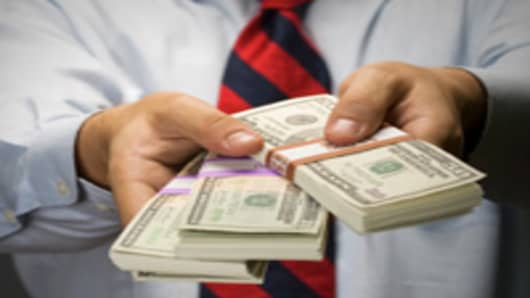The dollar fell after a weekend meeting of finance ministers from the Group of 20 most powerful economies failed to come up with a definitive agreement on currencies, but a currency strategist said this may just be a knee-jerk reaction and the greenback may be set to rise.
On Saturday, the G20 decided to give developing countries more voting power in the International Monetary Fund but stopped short from promising a solution to rising tensions in foreign exchange markets that sparked fears of protectionism.
"Any country considering capital controls now has the G20 behind them and is free to act," HSBC foreign currency strategist David Bloom wrote in a market research note. He said this would be a dollar-positive scenario.
"I'm not happy about this big rally in risk assets at all," Bloom told CNBC later. "Don't you get it? This is a substantive crisis of low growth, and everybody's going into risky assets."
One example may be the Hong Kong property market, which has seen a spectacular rebound since the global financial crisis, with real estate prices rising 50 percent since the end of 2008. Some analysts have blamed the Federal Reserve's quantitative easing measures for pushing capital towards Hong Kong assets.
Emerging markets will soon begin to fight the influx of speculative capital in earnest, Bloom said.
"A scenario where currency wars intensify, capital controls are implemented and the rise of protectionism increases is bad for global growth and equities but positive for the dollar," he said. "The market seems ill prepared for this."
"I'm getting a little bit concerned that the dollar selloff is getting too far, too fast," Bloom added.
Last week, famous investor Jim Rogers told CNBC that there were too many bearish investors into the greenback.
"Right now, all the surveys show that everybody is unbelievably bearish on the US dollar , including me," Rogers said. "Whenever you have everybody on the same side of the boat you'd better go to the other side, at least for a while."
At the weekend, the German finance minister accused the US of indirectly manipulating the dollar by its policy of quantitative easing.
The currency war is likely to persist at least through to the G20 leaders summit in mid-November, Bloom predicted, and it may affect stocks, not just foreign exchange.
"We are becoming more and more alarmed by the lack of concrete coordination," he wrote. "It is not impossible to see 'currency war' outbreaks cause the markets to move into a 'risk off' mode."


